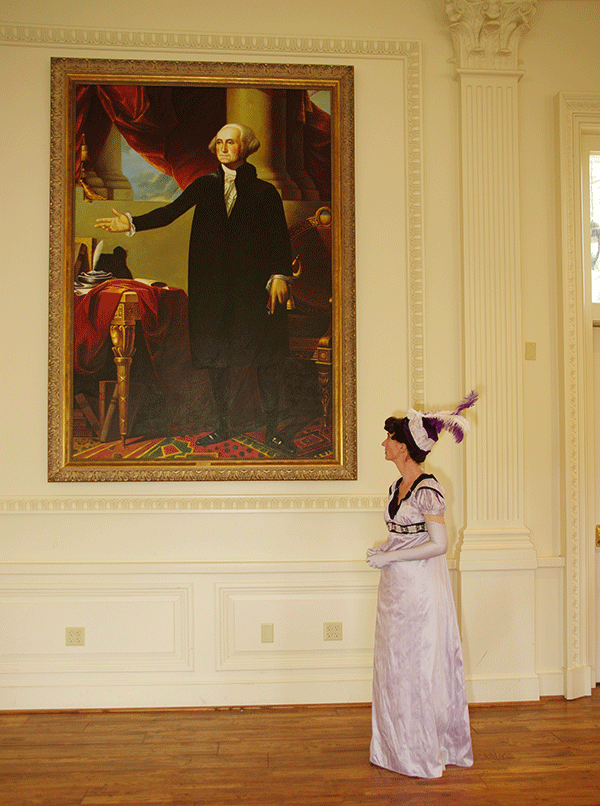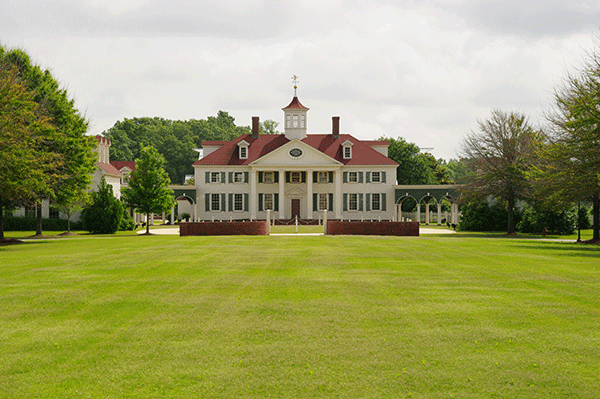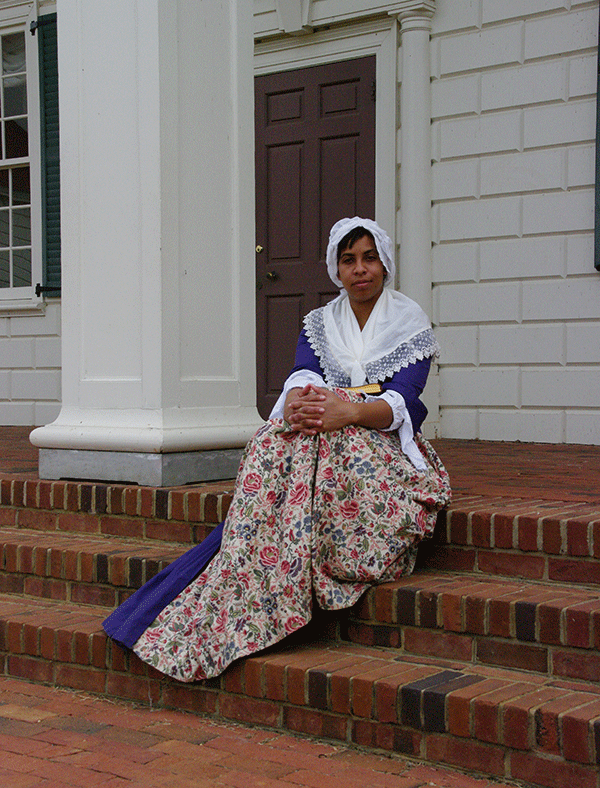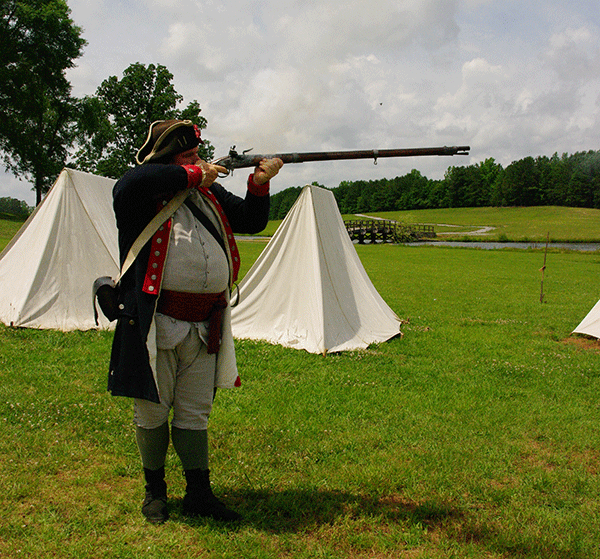
By Miriam Davis
“Make ready!”
“Aim!”
“Fire!”
“BANG!”
It’s not the sound of real gunfire, but the shouting of 30 or so high school students who fumble with their musket stand-ins – broomsticks – as they learn to drill and fire as part of the First Rhode Island Regiment.
The students are participating in a school program at the American Village Citizenship Trust. Established in 1999, the American Village is the brainchild of its founder and CEO Tom Walker. In the late 1980s, he developed the idea of a place where young people, as well as the general public, could cultivate a sense of ownership of their government by learning about citizenship and patriotism.
Walker, a self-described “history and political junkie,” says, “We have a great blessing of liberty in our country, but it’s difficult to maintain a sense of ownership of the civic system.” He thought that people needed reminding of “who we are and the things we believe in, of our shared values, and our shared experiences.
“We’re in an era in which we do a great job defining how we’re different from one another,” says Walker, “But it’s the idea of liberty that has always united us. When the national soul is contested as after 9/11, you see Americans coming together and reminding ourselves how valuable liberty is and remembering our kinship with one another.”
For young Americans, history need not be dry, dusty facts. “Young people respond to authentic stories,” he says.

The American Village campus sits on 183 acres in the gently rolling green hills of central Alabama, just outside Montevallo. The atmosphere has a colonial feel. In fact, many of the buildings are replicas of actual historical buildings. The administrative offices are located in a replica of the house in Philadelphia used by Presidents Washington and Adams before the capital moved to Washington, D.C. The Lucille Ryals Thompson Chapel, where a community Thanksgiving service is held every year, was inspired by the Bruton Parish Church of Williamsburg, a church attended by Thomas Jefferson, George Washington, and Patrick Henry.
What does it mean to be an American citizen?
Between 30,000 and 35,000 students come here each year, from Alabama, Georgia, Tennessee, and Florida. It’s not meant to be a museum, but living history, a place of ideas where visitors are made to think about “What does it mean to be an American citizen?”

The Village answers this question with dozens of different programs suitable for students of all ages. The programs consist of a collection of “vignettes” – episodes acted out by the costumed re-enactors called historical interpreters in which visitors often take part.
“Presidents’ Days” is designed for kindergarten through third grade. Kids play “Choose Your George,” a game show hosted by Martha Washington and Queen Charlotte of England in which participants cast their vote for who they’d rather have rule them: George Washington or King George III. Thankfully for the Republic, Washington usually wins.
The popular Thanksgiving program features Massasoit, or Yellow Feather, the chief of the Wampanoag who befriended the Pilgrims in Massachusetts. In the Colonial Christmas, children learn about how past presidents celebrated Christmas in the White House.
Teaching through hands-on participation
The centerpiece of the American Village’s educational programs is “Liberty,” which tells the story of how Americans gained their freedom from Great Britain. Participants get to stage a Stamp Act Rally, debate serious issues at a Constitutional Convention, enlist in the Continental Army, and take lessons in musket drill.
Today’s program is special. “Freedom Quest” was designed to honor Black History Month. The students are from George W. Carver High School in Birmingham, and are predominantly African-American. Their experience begins when they are transformed into a group of escaped slaves led by a rifle-toting Harriet Tubman, played by Lesli Johnson. In an encounter with a slave-catcher, one of their number must read from the Bible to trick him into believing they are free blacks; it was illegal to teach a slave to read. When they successfully arrive “up North,” Johnson stays in character to address the group: “Slavery must collapse. Thus, the action you have taken to make yourself free is just one more nail in slavery’s coffin. Well done.”
Next, the students become part of the Continental Army of General Washington. Chris Long, portraying Christopher Green of the Continental Army, urges them to join the First Rhode Island Regiment: “If you are an Indian, a mulatto, an indentured servant or even a slave, you now have the right to join the Continental Army and fight for our freedom.” For the soldiers of the regiment, he makes clear, it’s not just about the freedom of the nation, it’s about their own personal freedom. That’s what leads to instruction on how to fire a musket. After a bit of drill, Long jumps forward in time to congratulate them on their accomplishments during the war. He concludes by telling them that many of the Revolutionary soldiers, some of them African-American, were teenagers just like themselves: “They marched, they fought, they bled; some died. They died in pain, far from home, to bring you your freedom.” The experience has the intended effect. One student says, “Now that I realize what they had to go through, I’ll value my life and my freedom more.”

The American Village is open to the public 9 a.m.-5 p.m. on Mondays through Fridays for public tours. On patriotic holidays such as the Fourth of July and Memorial Day, it really comes to life. It’s all “fun, food, and fireworks,” says Melanie Poole, director of marketing and communications.
Visitors can wander through the campus watching the vignettes put on throughout the day. They can listen to Ben Franklin read the Declaration of Independence, Patrick Henry give his famous “Give me Liberty or give me death” speech, or Abigail Adams talk about being the wife of one of the Founders. Re-enactors fight the battle between Patriots and Redcoats at Concord Bridge. Visitors can play eighteenth-century games, learn about proper Colonial etiquette, or observe costumed dancers at an Independence Ball in Liberty Hall. At dusk, the Montevallo Community Band plays a patriotic musical tribute while fireworks crackle overhead.
In February of this year, the National Veterans Shrine and Registry of Honor opened on the grounds of the American Village. According to Poole, it is dedicated “to those of every generation who’ve served and sacrificed for the American people.” Its animating spirit is the idea is that veterans are individuals, each one someone’s son or daughter, each with a different story to tell. The Registry of Honor is a website on which vets or their family members can register. They can give the branch and dates of service, and upload photos and videos. The registry produces an individual video for each vet so that at computer kiosks in the shrine, a short movie about the vet’s service is available.
As he left Independence Hall at the end of the Constitutional Convention in 1787, Benjamin Franklin was asked, “What have we got – a republic or a monarchy?”
“A republic,” Franklin is supposed to have replied. “If you can keep it.”
The job of the American Village is to see that we do.
Miriam C. Davis is a research associate in history at Delta State University.




